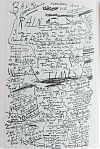
Morine Krissdóttir
Descents of Memory
The Life of John Cowper Powys
There are certain writers, who within their elaborately composed words, have strung a magnetic force like dynamite. When unread, the force lies dormant; when read there awakens strong stirrings, hints at explosion, tremulous and skipping the entire natural order of growth, the bud bursts: Ka-Bam! Struck still, the tremors and quakes continue and continue, never shall they loose their primal force for the words are always there within the pages and so is the fecund mind to taken them and the fecund spirit to glean from them.
These writers are not stumbled over, by dint of their rip-roaring nature, very frequently. Once in you’re in and you’ve got to devour all. Henry Miller will always be the all-powerful conductor of words who has awoken the most within me; his slot among the immortals is unrivaled. But, last year, I first read John Cowper Powys. John Cowper Powys is the Magician who has cast the most charming, the most potent, the most awe-rendering spell and I have since been stuck, transfixed, like a fool watching everything one has in the world jump over the edge. It is his elaborate sense of story and his sweeping intensity of character, his grandiose and lengthy descriptions of nature, his manias, his unarguable association with the mythical, magical, strange. His novels, which are mazes; god help me if I have been “entranced,” for it has been told that once entrance has been gained there is no way out.
John Cowper Powys learned to make structures, often apparently aimless, but of a pattern so complex that it was difficult to find the centre, and once inside, almost impossible to escape. He called them Romances.
If these mazes, written and constructed among the matter in John Cowper Powys’s mind, than the man must have been of such a caliber, such a life, of such manias that the deepest wells of my curiosity were pelted with so many pebbles and the echos and the ripples had no moment to settle. Who was this man? This mythopoet of unusual stature?
Aha! I handled the Autobiography, that brick! A book, as John wrote to Littleton, that would ““be the history of the growth and development of a solitary human consciousness,” but that he was “going to make it the the most original of all autobiographies by deliberately omitting the feminines in it.”“ Whether it was intentional or not, I got lost in “the maze with no essential key.” Upon finishing Autobiography I wasn’t sure if I knew anymore about the man, though I did get a good tasting of fetishes, manias and thaumaturgic urges.
Lucky for me, Morine Krissdóttir has written John Cowper Powys’s biography, Descents of Memory, and though it may not be a “key,” it is nothing less than a momentous enlightening. She admits in the Acknowledgments at the end that Descents of Memory was written “to get Powys finally out of [her] system.” I can imagine no better fuel; I can witness no brighter flame. What Krissdóttir has written is an impeccable history, unbiased, of a man skipped over by the annals of literary history; she has ensured that John Cowper Powys will no longer be forgotten.
I am sure of all this. Morine Krissdóttir’s work on other works of John Cowper Powys — his diaries and most notably co-editor/reviver of the previously abused capolavoro, Porius — means all admirers of this massive writer owe this woman a big Hip! Hip! Hooray!
I was dually impressed with Krissdóttir’s references to all of John Cowper Powys’s books. She did not make brief note of them, did not comment on them with a critic’s heavy hand but handled them with a steady and lingering touch befitting of the most careful seamstress. I was given the impression that not one nuance connected with the writer’s life, whether in his books or in his life, was overlooked. It was of especial interest to note how his numerous friends and family made their way into the casts of characters. So many connections to be drawn, so many mazes to wander through, it is a great relief to get some idea of who composes who.
If there was anybody I wanted to know about the most, besides the man himself, was all those women he left out of Autobiography, namely the women he loved and how they put up with his odd sexuality. Phyllis Playter was, as Krissdóttir alludes to, as trapped in John Cowper’s expertly constructed mazes of futile contradictions and metaphysical magicianship and wondery, the mystery of mixing myth and reality, as his best readers, and more.
In a letter to Peter Powys Grey, Morine Krissdóttir wrote:
I have been watching, word by word in those diaries of John Cowper, what he did to Phyllis. He made her into an image in the mind; she was the sylph Nineue that Merlin met in the forest of Broceliande. There he entertained her with a magic game: he broke a twig and drew a circle, then taught her the unbreakable spell which would imprison them both in the blossoming whitethorn bush. Phyllis could rage; she could collapse; she could comfort herself with music; but she could not escape. Maybe she didn’t want to.
The biographer has no doubt sympathized with Phyllis Playter, John Cowper’s Tiny Thin, his Elemental, his sylph. I do not wonder why. She was a woman much younger than John Cowper Powys, the renowned lecturer, when they met, with the whole of a life before her. They eventually moved to upstate New York, to Phudd Bottom, where she had to give up any love of a city life and warmth for deep-frozen winters. They moved again to England and then to Wales, where she felt like an “alien,” even after twenty years. This woman also had her “violences,” her breeches between myth and reality; but she was never barren in her love and devotion. Much of the work of John Cowper Powys would not have been possible without her.
It was not only the mystery of JCP’s relationships that I was curiously after when reading Descents of Memory. What keeps me coming back to John Cowper Powys is the evolving revolution—my own personal realization—of what he meant when he wrote “life-illusion.” The dark psychology of his contradictions, his Fear, his desire to be a Magician, his potent but not potent sexuality, were all in a continuous combination which impacted his interactions with the world and as much, his shrinking from it. It was working through all this (and more!) that his long novels were created.
If John Cowper Powys’s life-illusion “effectively removes everything hurtful to the safe distance of an imaginary world of his unconscious,” it was his Fear, manias and phobias, his “HORRORS,” which were the motivators.
Few of us but have, hidden away deep down in our nerves, some secret Fear which we are not “allowed” to speak of, even to our dearest. I suppose there have been cures by these ambiguous and dangerous psychoanalytical methods, but for myself I am inclined to think that it is better “to leave well” though it is not exactly well, “alone.” It is certainly alone we are, and must ever be in the last resort; and it seems to me that it is the wisest and safest course to carry our “madness,” our hidden Fear, about with us, and allow it to change, as it will, its outward form according to the age we have reached —John Cowper Powys, Autobiography
“He is unable or refuses to name this “fantastical Fear” although he is able to discuss various other “neurotic fears,” none of which seem, on the surface, to be connected to the Fear.” These other “neurotic fears,” his manias and phobias, all those myriad manifestations of a sensitive and active mind, were as eccentric as the fear of growing woman’s breasts and as blasé as abandonment.
Was his life-illusion then a mythical safe-haven, a cave in which he could weather any storm? Were the storms then as imaginary and as equally needed to sustain the life-illusion itself? When Wolf Solent lost his mythology it was because reality broke in; John Cowper Powys’s life-illusion was weak at points too, as his brother Theodore could always attest. He walked Nature to be soothed, he imagined great long stories, he named rocks and preformed rituals surrounding them, building up their mystery, he made connections with the inanimate. Through his life-illusions he explored the reflections of his self and not-self, all their mergings or not-mergings, and he wrote many convoluted histories.
What were the essences of his life are the essences of his “Romances.” Morine Krissdóttir shows the reader where to find the “secrets” in John Cowper Powys’s texts, in alchemy, in the myth of the Grail, Celtic myth, Arthurian myth. The multi-layered intricacies of his novels are still stunning even to those who have gotten deeper into the pages. I feel I’m just touching a bit below the visible iceberg.
To read the novels of John Cowper Powys is to enter into the extremes of mysteries, if willing, it is to surrender oneself to the magic the man learned to work, through words, through long brazen-images and long-ago grounded myth. What a pleasure it is to get so lost in the pages of mazes! What a writer! What books! What a strange dear man! Descents of Memory has helped, in the very least, to understand the magnetic pull of this persistent obsession.
Commentary for Descents of Memory
· · · · · · · · · · · · · · · · · · · ·

1 On Thursday 14 November 2013 ron wrote:
Wonderful essay on Powys and his novels.I’m always suprised that more people are not familiar with his work, with the possible exception of Wolf Solent.You mention Henry Miller.Miller was a great admirer of Powys as man and author;it was through an interview with Miller, recorded by Folkways Records many years ago,that I first learned of Powys.Miller also highly recommended Knut Hamsun in the same interview-two authors I came to love over the years.Powys,A Glastonbury Romance has to be one of the very best books ever written by an Englishman,or,anyone for that matter.